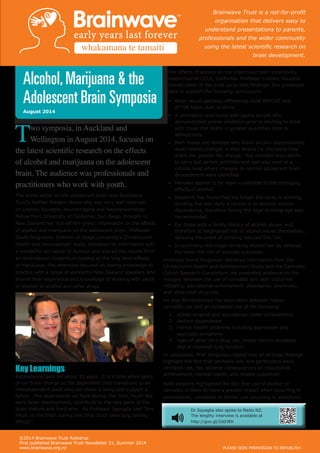
Alcohol-Symposium_A4-web
- 1. ©2014 Brainwave Trust Aotearoa First published Brainwave Trust Newsletter 21, Summer 2014 www.brainwave.org.nz PLEASE SEEK PERMISSION TO REPUBLISH Alcohol,Marijuana & the Adolescent Brain Symposia August 2014 Two symposia, in Auckland and Wellington in August 2014, focused on the latest scientific research on the effects of alcohol and marijuana on the adolescent brain. The audience was professionals and practitioners who work with youth. The scene setter on the adolescent brain was Brainwave Trust’s Nathan Mikaere Wallis who was very well received. Dr Lindsay Squeglia, Neuroimaging and Neuropsychology Fellow from University of California, San Diego, brought to New Zealand her ‘hot-off-the-press’ information on the effects of alcohol and marijuana on the adolescent brain. Professor David Fergusson, Director of Otago University’s Christchurch Health and Development study, delivered his information with a wonderful dry sense of humour and shared the results from an Australasian consortium looking at the long term effects of marijuana. The afternoon focused on linking knowledge to practice with a range of wonderful New Zealand speakers who shared their experience and knowledge of working with youth in relation to alcohol and other drugs. Key Learnings Adolescence lasts for about 15 years. It is a time when parts of our brain change as the dependent child transitions to an interdependent adult who can make a living and support a family. The experiences we have during this time, much like early brain development, contribute to the way parts of the brain mature and hard-wire. As Professor Squeglia said “Any insult on the brain during this time could have long lasting effects”. The effects of alcohol on the brain have been extensively researched at UCLA, California. Professor Lindsay Squeglia shared some of the most up to date findings. She presented data to support the following conclusions: • Brain neural pathway differences exist BEFORE and AFTER teens start to drink. • A correlation was found with young people who demonstrated poorer inhibition prior to starting to drink with those that drank in greater quantities later in adolescence. • Both males and females who drank alcohol demonstrated dose-related changes in their brains i.e. the more they drank the greater the change. This included their ability to carry out certain activities and was also seen at a cellular level where changes to normal adolescent brain development were identified. • Females appear to be more vulnerable to the damaging effects of alcohol. • Research has found that the longer the delay in starting drinking the less likely a person is to develop alcohol dependence, therefore raising the legal drinking age was recommended. • For those with a family history of alcohol abuse, and therefore at heightened risk of alcohol issues themselves, delaying the onset of drinking reduced this risk. • In summary, the longer drinking alcohol can be delayed the lower the risk of adverse outcomes. Professor David Fergusson delivered information from the Christchurch Health and Development Study and the Cannabis Cohort Research Consortium. He presented evidence on the linkages between the use of cannabis and later outcomes including: educational achievement, depression, psychosis, and other illicit drug use. He also demonstrated the association between heavy cannabis use and an increased risk of the following: 1. school dropout and educational under-achievement. 2. welfare dependence 3. mental health problems including depression and psychotic symptoms 4. risks of other illicit drug use, motor vehicle accidents and of impaired lung function. In conclusion, Prof. Fergusson stated that all of these findings highlight the fact that cannabis use, and particularly early cannabis use, has adverse consequences on educational achievement, mental health, and related outcomes”. Both sessions highlighted the fact that use of alcohol or cannabis is likely to have a greater impact when occurring in adolescence, compared to similar use occurring in adulthood. Dr Squeglia also spoke to Radio NZ. The lengthy interview is available at http://goo.gl/Zdd3EK Brainwave Trust is a not-for-profit organisation that delivers easy to understand presentations to parents, professionals and the wider community using the latest scientific research on brain development. whakamana te tamaiti